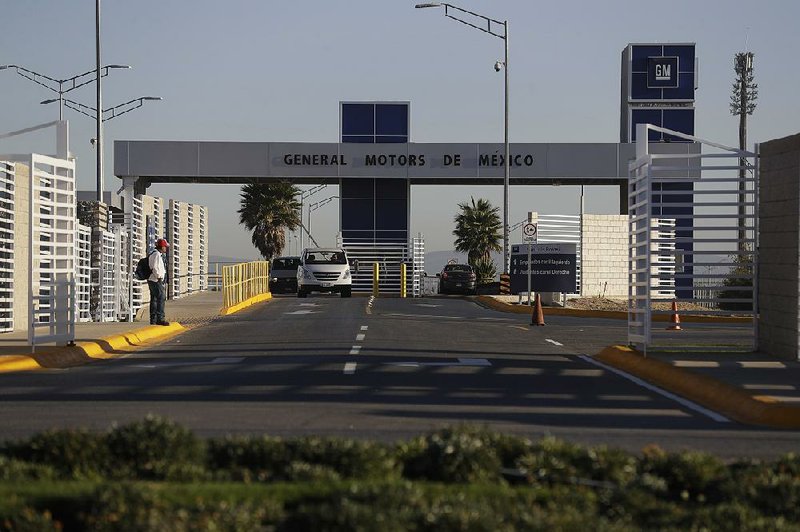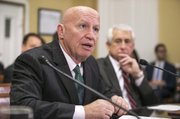WASHINGTON -- A U.S. House Republican proposal that would tax retailers for the products they import and sell in the United States is still in the early stages.
But the idea of a border adjustment tax as part of a broader tax package has retailers like Arkansas-based Wal-Mart Stores Inc. and Dillard's Inc. concerned enough to band together to fend off what they believe would have a significant impact on their bottom lines and their consumers.
Americans for Affordable Products formed earlier this month to spotlight the potential of the proposal, which has raised plenty of questions even among Republicans in Congress.
The Affordable Products group now boasts 150 members. And, although the retail industry has taken the lead in the lobbying efforts against a border tax, the coalition includes a wider scope of companies and organizations that could be affected by such a tax.
Nike Inc., Target Corp., Best Buy, Walgreens Co. and J.C. Penney Co. are also among retailers that have signed on as part of the coalition. Industry groups like the National Retail Federation, the American Apparel & Footwear Association and the Retail Industry Leaders Association are participating as well. Other industry organizations and companies -- like the American International Automobile Dealers Association and Toyota Motor North America Inc. -- have also pledged their support.
"No issue has galvanized the [retail] industry like this one has over the course of the last decade," said Brian Dodge, the senior executive vice president of public affairs with the Retail Industry Leaders Association. "We are hearing from companies who don't historically engage meaningfully in public policy who are asking who to talk to and how to communicate their concerns.
"The industry is activating itself against this proposal in a way that I've never seen it done before."
Economists and analysts believe retailers -- and other importers in industries like oil, energy and automotive -- have reason to be concerned as Republicans contemplate sweeping changes.
A border adjustment tax is part of a broader tax change plan that is being discussed by House Republicans, although no bill has been drafted. At the core of the proposal is a plan to change and lower the corporate tax rate from 35 percent to 20 percent.
Michael Pakko, chief economist at the Institute for Economic Advancement at the University of Arkansas at Little Rock, said change is needed.
Corporate tax changes also have the support of retailers who have the "highest corporate tax rates of any industry," according to the National Retail Federation. But the industry is not in favor of a 20 percent tax on imports -- the so-called border adjustment -- that is being mentioned to offset the lost revenue from a lower corporate tax rate.
If enacted, estimates indicate that would generate more than $1 trillion over the next decade.
"On the surface, it appears to be a tool for managing or manipulating trade in a sense that it would tax imports and leave exports untaxed," Pakko said. "In that sense, it encourages exports and discourages imports, and serves as sort of a trade barrier. At least, on the surface."
Pakko also said, in theory, a relative status quo would remain for businesses under the proposal because the dollar would strengthen, lowering the cost of imported products. Companies that export items would benefit from lower taxes while their products would be more expensive overseas.
Proponents of the House Republican proposal -- which include General Electric, the Boeing Co. and other members of the recently formed American Made Coalition -- believe the plan will level the playing field, helping U.S. manufacturers compete with products made overseas.
House Ways and Means Committee Chairman Kevin Brady, R-Texas, said in a statement that the main goal of the tax change blueprint is to "improve the lives of all Americans."
"That's why we are working to ensure that our tax code no longer favors Chinese steel over American steel, Mexican beef and autos over American beef and autos, and foreign oil over American oil," Brady said. "One of the best ways to protect the American dream is to tax imports and exports equally in our country. It's time to end the 'Made in America' export tax."
But opponents argue that there's no guarantee that the playing field would be level with the border adjustment tax, which would lead to added costs for companies that import products.
Edward Jones retail analyst Brian Yarbrough said if the dollar doesn't strengthen enough to offset the tax under the proposal, there's no doubt it would have an impact on retailers.
"Bottom line, for most retailers that source foreign goods, it's going to be a negative impact," Yarbrough said. "How much is that negative impact? It depends on a lot of moving factors."
Yarbrough said the tax burden would likely shift to consumers, resulting in price increases for goods like clothes, shoes, toys, gas and produce. According to the American Apparel & Footwear Association, 98.4 percent of the shoes and 97.3 percent of the clothes sold in the United States were imported in 2016.
The National Retail Federation estimates that a border adjustment tax would cost American households up to $1,700 in the first year alone and could threaten millions of jobs.
"It's absolutely damaging to the consumer," Yarbrough said. "At the end of the day you're basically shifting the tax burden from corporations to the consumer. Because now that the corporations are going to pay a lower tax rate, the companies that are impacted are most likely going to raise prices. The consumer is most likely not going to win in this environment."
Members of the all-Republican Arkansas congressional delegation aren't rushing to support the proposal.
"I'm still trying to learn more about it and understand it," said U.S. Rep. Bruce Westerman of Hot Springs. "That's one that we're going to have to analyze a little bit more and get some more facts and data about."
U.S. Rep. Steve Womack of Rogers said he wants to see a tax system that is "more simple and fair," and that lowers corporate tax rates, but he isn't sure whether the border adjustment tax should be included in the package.
"I have some concerns about border adjustability because of the potential it has for raising consumer prices on a lot of things that American consumers use on a daily basis -- everything from gasoline to bananas," he said.
The lawmaker said the law may have unintended consequences. "We've got to be very, very careful in our approach," Womack said.
In a written statement, U.S. Rep. Rick Crawford of Jonesboro said it's premature to weigh in on the issue.
"Until I at least see draft language for the border adjustment tax and the rest of the tax reform plan, it's purely speculative to render [judgment]. However, when we do have a plan to review, my bottom line will be whether or not the reform package will have a positive impact on economic growth and quality of life in the 1st District," he said.
U.S. Rep. French Hill of Little Rock is undecided on the matter.
"This is a complicated issue, and Congressman Hill is thoroughly reviewing and studying it before he makes a decision one way or another," said the lawmaker's spokesman, Mike Siegel.
On the other side of the Capitol, U.S. Sen. John Boozman of Rogers is still studying the proposal.
"He's been looking at it. He's heard from folks, and he does have some concerns, in terms of what he has learned about it so far," said the legislator's spokesman, Patrick Creamer.
U.S. Sen. Tom Cotton of Dardanelle also has reservations about the proposal.
"Sen. Cotton is deeply concerned by the border-tax proposal. It could significantly increase the cost of groceries, clothing, toys and other items, and hurt Arkansas families trying to make ends meet. He will work with his colleagues to make sure that the final tax-cut package reflects the interests of hardworking Arkansans," said Caroline Rabbitt, the senator's spokesman.
Wal-Mart officials declined to comment about the border adjustment tax and its potential impact on the company, but Chief Executive Officer Doug McMillon was in Washington, D.C., earlier this month as part of President Donald Trump's business council.
McMillon said in a statement after the meeting that job creation and the economy were part of the "constructive and candid" conversation. McMillon also said he was looking forward to continued discussions and that the retailer has long believed it was "always better to be engaged in trying to shape solutions than sitting on the sidelines."
Economists and analysts believe that there won't be a change adopted anytime soon, but the stakes are high as businesses lobby on both sides of the issue.
Kathy Deck, director of the Center for Business and Economic Research at the University of Arkansas, said recently that if a border adjustment tax is enacted, it would present an enormous strategic challenge as well as a substantial shift for retailers and businesses like Wal-Mart.
"We don't know what the final proposal will look like," Deck said. "But we do know it would cause companies to fundamentally rethink how they source, how they replenish and how they price."
SundayMonday on 02/12/2017






